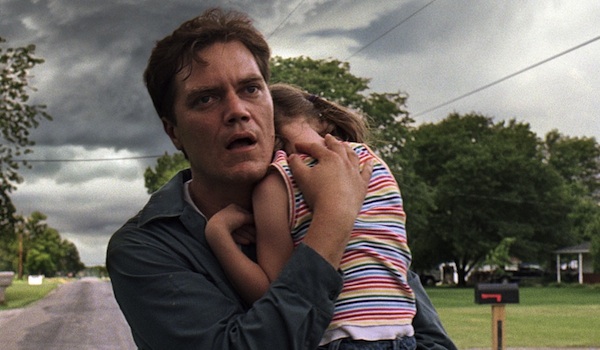Take Shelter Review
Psychological character studies seem to be all the rage right now on the indie circuit, but as compelling as this subgenre often is, it’s also one that feels a little played out. I love films like Shutter Island and, more recently, Martha Marcy May Marlene, but somewhere in the back of my mind, I’m wondering “What else is there for filmmakers to explore?”
Take Shelter director Jeff Nichols answers that question with a resounding “Plenty.” This is an incredibly timely film that tackles issues of fear and the potential loss of the American dream. At the same time, it’s a chilling examination of a man losing his grip with reality in some unexpected and somewhat bizarre ways.
Michael Shannon plays the man in question. His name is Curtis, and when the film begins, he’s a happy husband and father in rural Ohio. Suddenly, however, he starts having these very vivid dreams. He sees a storm coming that will wipe out anything in its path, so he begins revamping the old tornado shelter in the backyard. “Fine,” thinks Curtis’ wife, Samantha (Jessica Chastain), at first, but Curtis starts acting stranger and stranger by the day. He always seems ill, and soon starts lashing out at both Samantha and their young deaf daughter (Tova Stewart). He is convinced his dreams are real, but his behavior and family history tell him and everyone around him something different—that he’s losing his mind.
The parallels between Take Shelter and Martha Marcy May Marlene are obvious. Both films feature dynamic lead performances (Michael Shannon for the former, Elizabeth Olsen for the latter, respectively). They also deal with individuals whose psyches are damaged. The main difference between the two character studies is that it isn’t quite clear how mentally ill Shannon’s Curtis really is. With Olsen’s character in ‘MMMM’, we know by the halfway point that she’s either totally gone or close to it. What Nichols ultimately does here really caught me off guard. He presents the possibility that Curtis’ premonitions aren’t actually symptoms of illness, but rather honest-to-goodness visions of a coming apocalypse. Still now, I’m not sure if the film was the searing character study I expected or some trippy sci-fi film about a modern-day prophet, and I really loved that ambiguity.
Such ambiguity, of course, is impossible without such stellar work from Michael Shannon. Curtis internalizes almost everything, but you can see his insecurities boiling just under the surface, only to explode in one of the film’s most compelling scenes. Shannon, likely familiar to most viewers from his Oscar-nominated performance in Revolutionary Road, can do manic better than just about anyone. What can I say, he’s got a face suited for crazy, and the physique of a gentle giant. Coupled with his obvious skill, these traits form a three-dimensional character that we sympathize with greatly. It’s without a doubt one of 2011’s strongest performances.
Jessica Chastain, of course, is 2011’s breakout star, and though I think I preferred her work in The Help, she’s still terrific in a really complex role. She sells both her frustration and pity with her husband quite well, keeping us in the dark most of the way as to whether or not she’ll stay with him.
The rest of the cast is made up primarily of character actors, but there are some gems in the bunch. Kathy Baker is vaguely familiar to me, and her one scene in Take Shelter is a standout. Seeing what might await Curtis if he doesn’t figure out his problems is disquieting to say the least. It’s clear his mother is a gentle soul (like him), but there’s no ignoring the way she damaged him, intentional or not, and it’s clear Curtis could do the same to his own family. Also good is Shea Whigham as Dewart, Curtis’ hot-headed best friend. All it takes is a couple brews to get Dewart to act foolishly or disrespectfully. The alternative, of course, is that he gets emotional and starts spilling his guts. He does so in one key scene early on. “You’ve got a good life, Curtis. That’s about the best compliment you can give a man,” he remarks. If only he knew the truth about his good friend…
Many people seem frustrated by Take Shelter‘s ending, but I’m not sure why. Other than the fact that I think it should have come about 15 minutes sooner, I couldn’t have been happier with how things conclude. Without getting into too many details, it’s an ambiguous ending—perhaps the most ambiguous one since A Serious Man. But it opened up a number of new possibilities for me and made me want to watch the film again right away. Can’t say that about many other new movies.
Take Shelter is definitely a languidly paced film, and the narrative arc is subtle, but it’s hard for me not to be enamored with any film that has such an outstanding lead performance, nevermind one with such an unusual hook to it. I’m thinking Oscars won’t be in the cards for the film, but Nichols is a talent I’ll definitely be watching out for (his debut, Shotgun Stories is now near the top of my Netflix queue), and hopefully Michael Shannon will be more of a household name, for he’s one of the best there is right now.
















